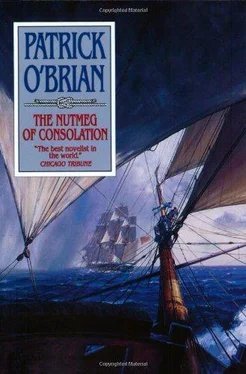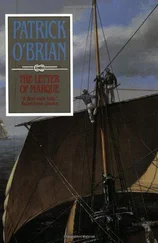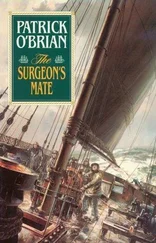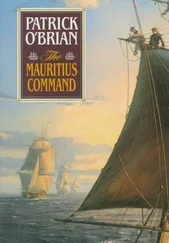Patrick O'Brian - The Nutmeg of Consolation
Здесь есть возможность читать онлайн «Patrick O'Brian - The Nutmeg of Consolation» весь текст электронной книги совершенно бесплатно (целиком полную версию без сокращений). В некоторых случаях можно слушать аудио, скачать через торрент в формате fb2 и присутствует краткое содержание. Жанр: Книги. Описание произведения, (предисловие) а так же отзывы посетителей доступны на портале библиотеки ЛибКат.
- Название:The Nutmeg of Consolation
- Автор:
- Жанр:
- Год:неизвестен
- ISBN:нет данных
- Рейтинг книги:3 / 5. Голосов: 1
-
Избранное:Добавить в избранное
- Отзывы:
-
Ваша оценка:
- 60
- 1
- 2
- 3
- 4
- 5
The Nutmeg of Consolation: краткое содержание, описание и аннотация
Предлагаем к чтению аннотацию, описание, краткое содержание или предисловие (зависит от того, что написал сам автор книги «The Nutmeg of Consolation»). Если вы не нашли необходимую информацию о книге — напишите в комментариях, мы постараемся отыскать её.
The Nutmeg of Consolation — читать онлайн бесплатно полную книгу (весь текст) целиком
Ниже представлен текст книги, разбитый по страницам. Система сохранения места последней прочитанной страницы, позволяет с удобством читать онлайн бесплатно книгу «The Nutmeg of Consolation», без необходимости каждый раз заново искать на чём Вы остановились. Поставьте закладку, и сможете в любой момент перейти на страницу, на которой закончили чтение.
Интервал:
Закладка:
'I was contemplating on sloops. A friend of mine wrote a novel and showed it to me for my opinion, as a naval man.' The gunroom looked down at their plates with a certain fixity of expression. 'I thought it a very pretty tale, but I did take exception to the hero's commanding a sloop and taking a French frigate: yet just now it occurred to me that the Corn�e is undoubtedly a frigate; that we, though small, aspire to take her; that perhaps my objection was unfounded, and that sloops do in fact capture frigates.'
'Oh no,' they cried, the Doctor was wholly in the right -never in the history of the Royal Navy has any sloop taken any frigate - it would have been flying in the face of nature.
'But on the other hand,' said Jack, 'a post-ship of much the same displacement and broadside weight of metal as a sloop has been known to do it. It is the presence of a post-captain aboard, and his moral superiority, that turns the scale. A glass of wine with you, my dear sir. Now, gentlemen, in a few minutes' time we shall be mustering the watch, so I shall thank you for a splendid supper, take a look at the sky, and then turn in.'
'And we must thank you for some splendid wine, sir,' said Fielding. 'It will be my standard of excellence whenever I drink port again.'
'Hear him, hear him,' said Welby.
On deck the breeze had freshened perceptibly, coming in warm over the rail, one point on the quarter. By the light of the binnacle the log-board showed that their speed had increased to eight knots and three fathoms: and the Corn�e was keeping up.
The moon showed her clear, but it was not so brilliant that it hid the light of the battle-lanterns on her forecastle or the suffused glow from the open ports along her side, still less the stab of flame as she let fly with her starboard chaser. Both ships were now well into the Passage. To the south he could see the lights of a fishing-village, just where his chart had set it. The other side was too far off to see clearly, but it heaved up there, silvery in the moonlight with great black shadows.
Eight bells. Seymour relieved Richardson: the watch was mustered and the starbowlines went below to get what sleep they could with the guns banging and growling on the deck above. Fielding had come up to ease Seymour into his first independent watch and he was now in the waist, going through the motions of shipping the frame and its lanterns on the decoy boat, now poised so that it could be lowered down in a moment - motions that the chosen band, made up of Bonden, two bosun's mates and a very powerful black sheet-anchor man called Darkie had already performed again and again.
Jack watched them for a while and then walked into the bows with Fielding. 'I shall be very surprised if the Corn�e don't pipe down now,' he said. 'But in any case I mean to draw ahead another couple of cables' lengths, to prevent any stray ball doing real harm; though of course she must have our stern-windows clear in sight. I shall give the orders to brace up and ease off the buoy and then turn in. Good night to you.'
'Good night, sir.'
As Jack was going below the gunfire died away, the Nutmeg having the last word; and as he turned in he saw that he was not to sleep in the dead man's cot. His own, an unusually long one, had been brought down and slung fore and aft. Killick was in many ways a wretched servant, fractious, mean, overbearing to guests of inferior rank, hopelessly coarse; but in others he was a pearl without a thorn. For a moment Jack passed some other expressions in review, and having reached bricks without price he went to sleep.
The familiar waking to a faint lantern in the darkness and the words 'Close on eight bells, sir.' He woke at once, as he had woken so very often since his boyhood, said 'Thank you, Mr Conway,' and swung out of his cot. Some unsleeping recorder had taken notice of the ship's progress during this time and he was not at all surprised to learn from the run of the water along her side that the Nutmeg had lost speed.
Shirt, trousers and canvas shoes, and he walked quietly out of the dim gunroom. In the moonlit waist he cupped his hands in the scuttle-butt, dashed water into his face and came aft as the sentry went forward to strike eight bells.
'You are a good relief, sir,' said Seymour. 'But I am very sorry to say the breeze has dropped.'
'Nip,' cried Conway, and coming across from the lee rail he reported 'Seven, sir, seven on the knot.'
'Good night to you both,' said Jack; and as the wheel, the con, the lookout posts and the guns changed hands he retired to the taffrail. Away on the larboard quarter now, well out in the channel, there lay the Corn�e, a little farther, a little dimmer. The moon, passing through a veil of cloud, was near her height: high water would come well after her southing and in any case the Alkmaar had stated as a known fact that it was three hours later here than at Nil Desperandum; yet even so the flood would have been setting west for some time now. With the log-board by a stern-lantern he added up the figures for the last four hours' progress. Thirty-one sea-miles. It was not what he could have wished, but it was not very bad: the issue was still open. This present watch, the graveyard watch, was the decisive period, for it was now that the tide would have its say. He had of course asked about the Passage as soon as he heard that the Corn�e was likely to take it, and he had learnt that unlike some parts of the Pacific it had two high tides in a lunar day, the first no great matter, the second, that which the Nutmeg was to stem throughout his watch, stronger. But just how much stronger no one in Batavia could tell him. Of course it depended on the age of the moon, and in her present gibbous state she would not be exerting her full influence nor anything like it. From all their calculations and from what little they had in the way of observations from Dalrymple, Horsburgh and others he and the master (an excellent navigator) had decided that at this point in the lunar month they could expect a westward current of two and a half knots; and in his plan he had allowed for rather more than three.
Few things are harder than judging relative movement by night on an unknown coast with little in the way of marked features. By now most of the few scattered villages had put out their lights, and the difficulty of locating them was increased by the glowing remains of fires lit to clear scrub and forest earlier in the day.
Bell after bell the midshipman of the watch reported seven knots, seven and two fathoms, seven and one fathom, while every hour the carpenter or one of his mates stated the depth of water in the well: never more than six inches. And throughout this time Jack Aubrey examined the shore with his night-glass, trying to find a bearing that would give him some notion of the current's speed. A vain attempt: for this some near, clear, fixed point was required.
At just after three bells the fixed point appeared; and not one fixed point but four: four anchored fishing-boats strung out in a line two cables' lengths away on the starboard bow, all with flaring lights to attract the fish. 'Mr Oakes,' he called, 'bring log-board, chalk, half-minute glass and a lantern.'
He hurried along the gangway and as the first boat came abeam he called, 'Turn', followed it with his azimuth compass until Oakes cried 'Out' and so read off the difference. The same with the second, third and fourth boats, all far enough apart for his mind to reach an approximate, shocking solution of the triangles.
He went below and worked them out carefully. They were even worse than he had supposed: the tide was flowing at five and a half knots and when the moon was farther west it would flow faster still. The ship's speed with regard to the land was two miles an hour less than he had counted on. The tide would flow six hours in all, setting the far end of the Passage twelve miles farther off, and by the time they reached it the sun would be well up in the sky.
Читать дальшеИнтервал:
Закладка:
Похожие книги на «The Nutmeg of Consolation»
Представляем Вашему вниманию похожие книги на «The Nutmeg of Consolation» списком для выбора. Мы отобрали схожую по названию и смыслу литературу в надежде предоставить читателям больше вариантов отыскать новые, интересные, ещё непрочитанные произведения.
Обсуждение, отзывы о книге «The Nutmeg of Consolation» и просто собственные мнения читателей. Оставьте ваши комментарии, напишите, что Вы думаете о произведении, его смысле или главных героях. Укажите что конкретно понравилось, а что нет, и почему Вы так считаете.












